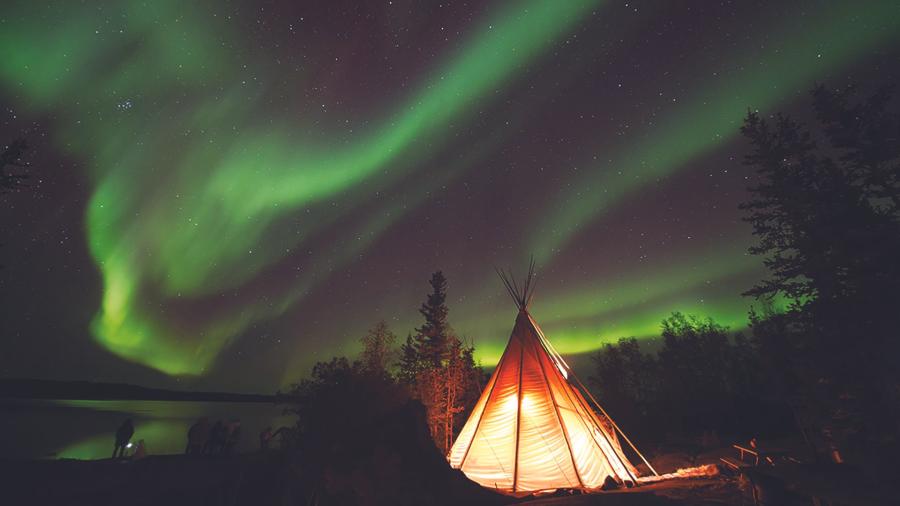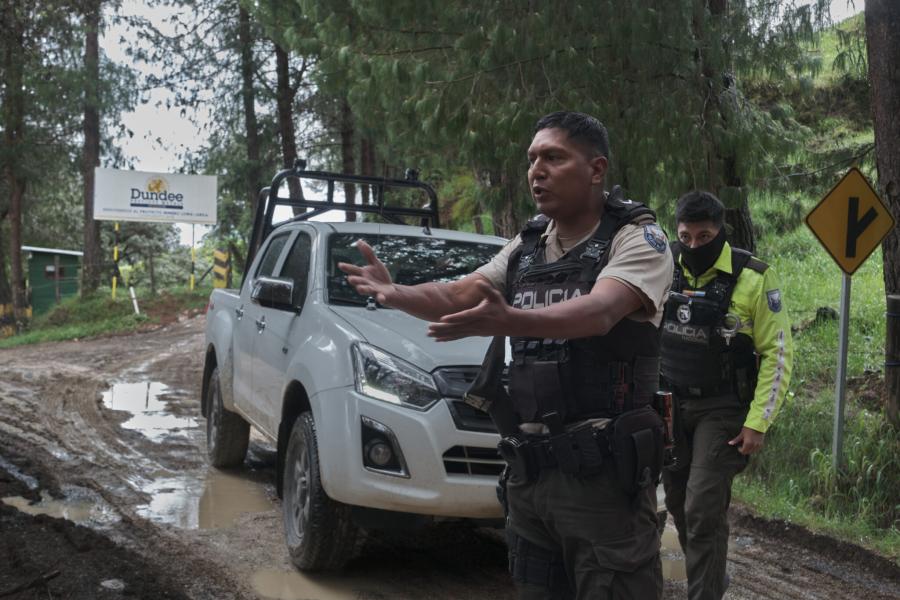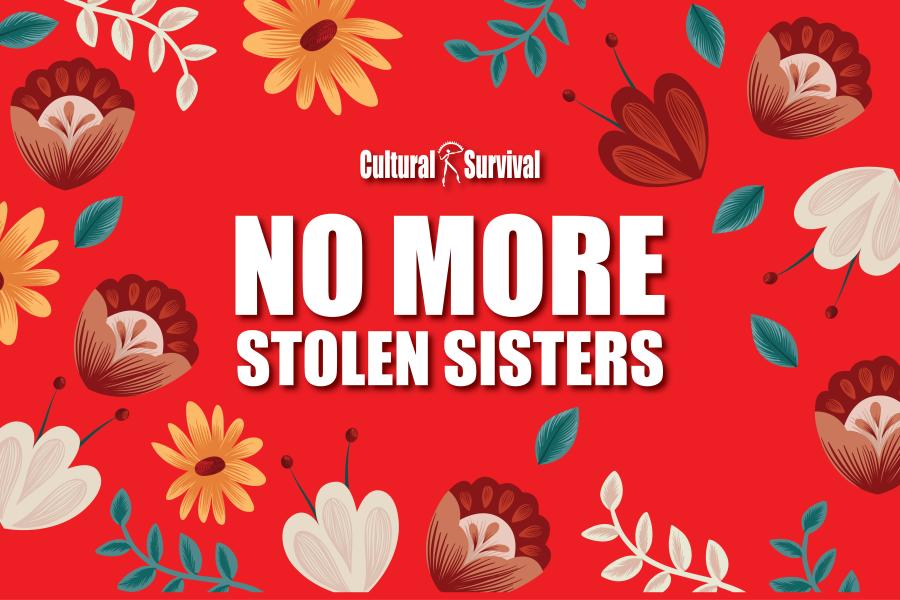The Innu
The indigenous people of Newfoundland and Labrador, a mix of populations of Inuit, Montagnais, Quebec Naskapi, and other Indians loosely referred to as Innu, are involved in opposing a major expansion of low-level military training flights over their territory (an article on this will appear in Cultural Survival Quarterly 14(2)). Over the last few decades, the Innu have been centralized from their traditional nomadic life to one greater government dependence in the towns of Happy Valley and Goose Bay. Returning to the bush for hunting and trapping has been urged by the elders as an indispensible experience for the younger generation to regain health and avoid the problems of alcohol and substance abuse. The disruption caused by low-level flights threatens the Innu way of life.
Canada's Department of National Defence (DND) is currently in the middle of an environmental assessment of the proposed expansion. Cultural Survival (Canada) is providing technical advice on the Environmental Impact Statement, as well as supporting the Innu through fundraising and public education. The hearings will provide an opportunity to challenge the DND study. In the meantime, DND is determined to continue its campaign to sell NATO on the advantages of a major base in Labrador.
The Algonquin
A small band of several hundred Algonquin Indians in remote Barriere Lake, Quebec (approximately 170 km north of Ottawa), are lobbying desperately to prevent the issuance of logging permits over the area in which they traditionally hunt and trap. The Algonquin of Barriere Lake, inhabitants of one of the poorest reserves in Canada, have been blocking the major logging road running through the La Verendrye Wildlife Reserve near their home. They argue that 50 percent of the forests in their area have been clear-cut over the past 20 years. The additional logging permits would essentially allow the clear-cutting of the rest, establishing "wildlife corridors" in a weak attempt to maintain the local populations of moose. The Algonquin are pleading with the Quebec government to develop a plan for "sustainable development" of the area based on the principle from the report of the World Commission on Environment and Development.
Since August 1989, when the band set up its blockade, logging has come to a standstill. Chief Jean-Maurice Matchewan was arrested later that fall, but he still persists in his hope that the Quebec government will suspend permits until a full review of the environmental and cultural implications of the widespread clear-cuts can be completed. Cultural Survival (Canada) is working with the Algonquin, primarily through assistance in fundraising and public education. (See Cultural Survival Quarterly 13(2), latter from Dr. Sue N. Roark-Calnek, p.61.)
The Teme-Augama Anishinabe
The Teme-Augama Anishinabe, or "Deep Water People," of Bear Island, Ontario, have been blocking the construction of a new logging road into the last old-growth white pine forest in Ontario. Thus far, more than 220 people have been arrested, including Chief Gary Potts. Environmentalists, including the well-known writers Margaret Atwood and Farley Mowat, have joined forces with the native band in an attempt to persuade the government of Ontario to preserve the area, known as "Temagami."
The Teme-Augama Anishinabe filed a land claim over the area in 1973, and they have been in active negotiations. With the federal government ever since. Pressures for logging have been intense, especially from the non-native community in the area. The provincial government is primarily responsible for decisions about forest harvesting. So far they have been intransigent in maintaining that the logging must proceed. However, in late November the government announced a partial freeze on logging. Environmentalists and native peoples remain skeptical about the government's intent and anticipate further arrests.
The Dene of Hatchet Lake
A recent spill of radioactive contaminated water from the Rabbit Lake Uranium Mine in Northern Saskatchewan led to the demand by Chief Benonie of the Hatchet Lake Band for a full and independent review of existing and proposed uranium mines in the region. The Innuit of Baker Lake in the Northwest Teritories are now faced with a proposed uranium mine. Chief Benonie has been quick to point out that his people have not benefited from the mines. No Indians work there and contamination of wildlife has been a problem for some time. But the spill of 20 million liters of water contaminated with Radium 226, arsenic, and other heavy metals has increased the national focus on the plight of the Hatchet Lake Band. Cultural Survival (Canada) Participated in a joint press conference to publicize the issue.
The Lubicon
Northern Alberta is currently slated to develop 13 new pulp and paper mills. The two largest are Japanese projects: Daishawa and Alberta Pacific, a consortium of Mitsubishi and Honshu Paper. These two have been granted harvesting rights to a combined area of 15,000 of virgin Boreal forest. The Daishawa plant is being built on land contested by the Lubicon Cree. Their chief, Bernard Omniak, has been successful in pushing both levels of government to consider compensation for the loss of their lands, but the issue is far from resolved.
The environmental impacts of the proposed plants have the government of the Northwest Territories concerned as well. Their presentation to the current environmental assessment hearings suggested that toxic contamination by dioxins and furans could reach as far north as Great Slave Lake, Several hundred miles away. Cultural Survival (Canada) is helping to publicize the Japanese involvement in this and other environmental assaults around the world - from drift nets to the forests of Sarawak. As well, CSC is launching a National Boreal Forest Campaign that will address the combined. Threats to our northern forests and the people who have lived in harmony with them for generations. Through this campaign, we will work with the lubicon as well as the Quebec Cree (who face another hydroelectric dam megaproject at James Bay), the Teme- Augama Anishinabe, and First Nations across Canada, fighting to preserve what is left of our forests.
The Gwich'in
The Gwich'in of the western Yukon and Alaska are fighting the proposed development of the "1002 lands" on the US side of the border for oil and gas extraction. The area, protected on the Canadian side by a national park, is an important habitat for the porcupine caribou, the life source for the Gwich'in. Environmentalists have supported the call by the Yukon government and native peoples that the area be declared an international park on both sides of the border.
In the wake of the Exxon Valdez spill, the proposed development making its way through the US Congress has been put on hold. Meanwhile the Gwich'in are mobilizing support for their cause and have asked Cultural Survival (Canada) for assistance. CSC is working closely with Indigenous Survival International, a native group representing indigenous people from Canada, Greenland, and Alaska.
Cultural Survival (Canada)'s offices are located at Suite 420, 1 Nicholas Street, Ottawa K1N 7B7; tel. (613) 233-4653, fax: (613) 233-2292.
Article copyright Cultural Survival, Inc.



